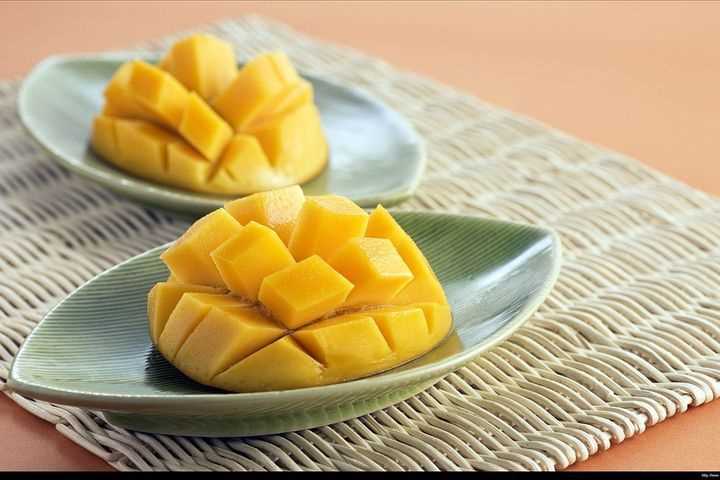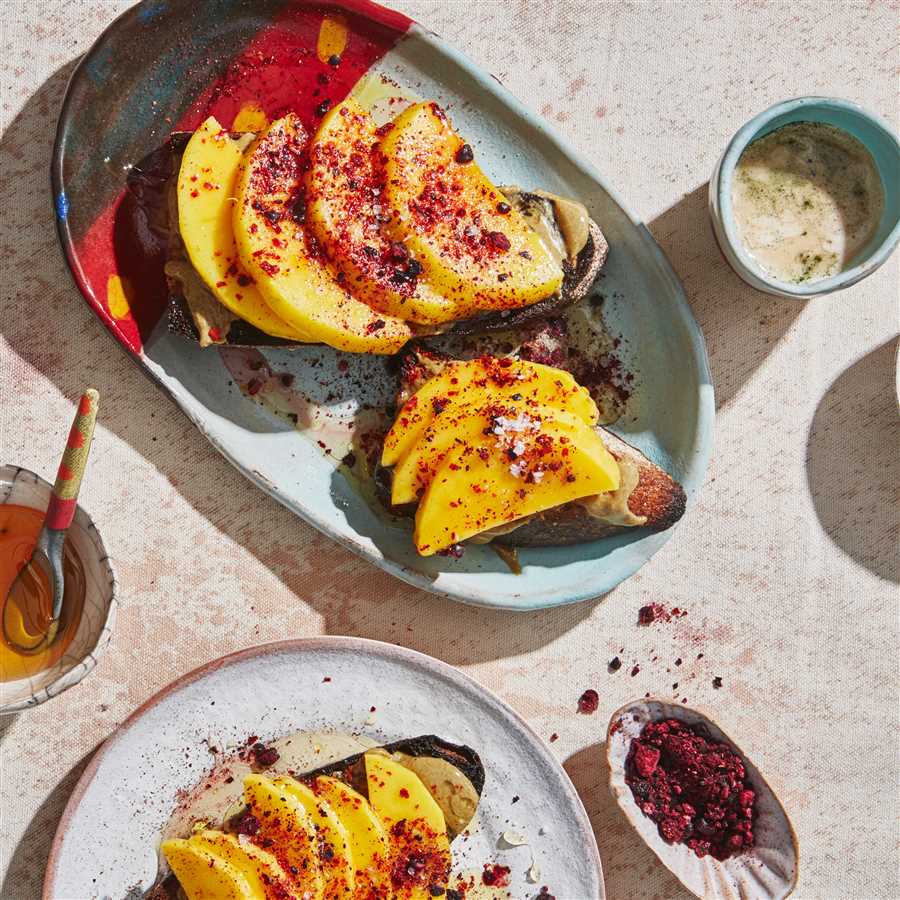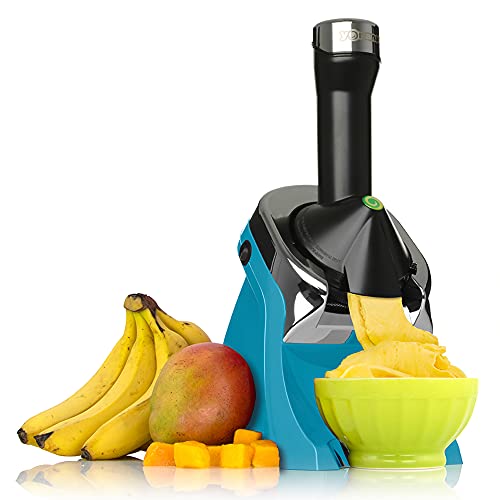
Mango is a delicious tropical fruit that is native to South Asia. It is known for its vibrant color, sweet taste, and unique aroma. While mangoes are often enjoyed fresh and raw, they can also be incorporated into a variety of cooked dishes.
Cooking mango can enhance its flavor and create a different culinary experience. The heat helps to release the natural sugars in the fruit, making it even sweeter and juicier. Whether you are grilling, baking, or sautéing, mangoes can add a tropical twist to both savory and sweet dishes.
One popular way to cook mango is by grilling it. The heat from the grill caramelizes the fruit, giving it a slightly smoky flavor and a beautiful charred appearance. Grilled mango can be served as a side dish, added to salads, or used as a topping for grilled meats or seafood.
Another way to cook mango is by baking it. Baking mangoes brings out their natural sweetness and creates a soft and tender texture. Baked mango can be used as a filling for pastries and cakes, or simply enjoyed on its own with a dollop of whipped cream or ice cream.
Why Cooking Mango is Worth Trying
Mangoes are delicious tropical fruits that can be enjoyed in many ways, including eating them fresh or using them in various recipes. While mangoes are often enjoyed in their raw form, cooking mangoes can add a whole new level of flavor and texture to dishes. Here are a few reasons why cooking mango is worth trying:
1. Enhanced Flavor

Cooking mangoes can intensify their natural sweetness and enhance their flavor profile. When mangoes are exposed to heat, their sugars caramelize, resulting in a rich and complex taste. This makes cooked mangoes a great addition to both sweet and savory dishes.
2. Versatility in Recipes
By cooking mangoes, you can unlock their versatility in various recipes. They can be used to make delectable desserts like mango cheesecake, mango ice cream, or mango tart. Additionally, they can be incorporated into savory dishes such as mango salsa, mango chutney, or mango chicken curry. The possibilities are endless!
3. Texture and Appearance
Cooked mangoes have a soft and tender texture that can be quite pleasing to the palate. They can add a delightful melt-in-your-mouth sensation to dishes. In addition to their texture, cooked mangoes also lend a vibrant and colorful appearance to recipes, making them visually appealing.
4. Health Benefits
Mangoes are not only delicious but also packed with nutrients. They are a rich source of vitamin C, vitamin A, and dietary fiber. Cooking mangoes can help break down some of the fiber and make it easier to digest, allowing your body to absorb more nutrients. So, cooking mangoes not only enhances their taste but also makes their nutrients more accessible.
Overall, cooking mango is definitely worth trying for the enhanced flavor, versatility in recipes, texture and appearance, and health benefits it offers. So, go ahead and explore the wonders of cooking with mangoes!
Exploring New Culinary Horizons
When it comes to trying new foods, the possibilities are endless. One versatile fruit that is worth exploring in the kitchen is the mango. Known for its juicy and sweet flavor, mango can be incorporated into various dishes to add a tropical twist to your meals.
One popular way to enjoy mango is by cooking it in savory dishes. The sweetness of the mango pairs well with spicy flavors, making it a great addition to curries, salsas, and chutneys. The vibrant color and unique taste of mango can elevate the flavors of these dishes, giving them a refreshing and exotic touch.
If you’re looking for a light and refreshing snack or dessert, you can simply enjoy mango as it is. Slice it up and serve it with a sprinkle of lime juice or a dollop of yogurt for a refreshing treat. You can also blend mango into smoothies or puree it to make a delicious mango sorbet.
For those who prefer baked goods, mango can also be used in cakes, muffins, and tarts. Its natural sweetness adds a burst of flavor to these desserts, making them even more decadent and irresistible. Whether you’re baking a cake from scratch or experimenting with a new recipe, mango can be a delightful and surprising ingredient to work with.
When it comes to cooking mango, the options are truly endless. Whether you’re a seasoned chef or an amateur cook, don’t be afraid to explore new culinary horizons and experiment with this tropical fruit. From savory dishes to sweet treats, mango can add a touch of exoticism to your meals and take your taste buds on a delightful journey.
| Benefits of Cooking Mango |
|---|
| Mango is a rich source of vitamins and minerals, including vitamin C and vitamin A. |
| Cooking mango can help enhance its natural flavors and add depth to your dishes. |
| Using mango in your cooking can provide a burst of tropical sweetness to your meals. |
| Mango is a versatile fruit that can be used in both savory and sweet recipes. |
| Experimenting with mango can expand your culinary skills and introduce you to new flavors. |
The Versatility of Mango

Mango, also known as the king of fruits, is not only delicious but also versatile in the kitchen. This tropical fruit can be used in a wide variety of dishes, from sweet desserts to savory entrées.
One popular way to enjoy mango is by using it in salads. Its sweet and tangy flavor adds a refreshing twist to any salad. Pair it with some greens, avocado, and a light dressing, and you have a perfect summer salad.
Mangoes can also be used to make salsas and chutneys. The natural sweetness of the fruit balances well with the heat of chilies, creating a perfect combination of flavors. Mango salsa is a great accompaniment to grilled meats or fish, while mango chutney can be spread on sandwiches or served as a condiment.
For those with a sweet tooth, mango can be used in a wide range of desserts. From mango ice cream to mango cheesecake, the possibilities are endless. Its vibrant color and natural sweetness make it a perfect ingredient for summer desserts.
But mango is not just limited to sweet dishes. It can also be used in savory recipes. Mango chicken curry is a popular dish in many cuisines, combining the sweetness of the fruit with the richness of spices. Mango can also be used as a topping for pizzas or added to stir-fries for a burst of flavor.
In addition to its culinary uses, mango is also packed with nutrients like vitamin C and fiber. It is known to boost the immune system, improve digestion, and promote healthy skin.
So next time you see a ripe mango at the grocery store, don’t just think about eating it as is. Get creative in the kitchen and explore the versatility of mango in your cooking!
Mango Recipes for Every Taste
If you are a fan of mangoes, you will be delighted to know that there are numerous delicious recipes that you can try with this juicy and tropical fruit. Mangoes are not only sweet but also packed with essential vitamins and minerals, making them a perfect choice for a healthy and tasty treat.
Mango Smoothie
One of the simplest and fastest ways to enjoy the taste of mango is by making a refreshing mango smoothie. All you need is a ripe mango, some ice cubes, and a blender. Peel the mango and cut it into cubes, then put it in the blender along with some ice cubes. Blend until smooth and serve it chilled. You can also add a squeeze of lime juice or a handful of fresh mint leaves to enhance the flavor.
Mango Salsa
If you are a fan of spicy and tangy flavors, mango salsa is a must-try recipe. It is a perfect combination of sweet mangoes, spicy jalapenos, tangy lime juice, and fresh herbs. To make mango salsa, dice a ripe mango and combine it with finely chopped red onion, jalapeno pepper, cilantro, and lime juice. Mix well and let it sit for a few minutes to allow the flavors to meld. Serve it as a dip with tortilla chips or as a topping for grilled chicken or fish.
Mango Salad
A mango salad is a refreshing and nutritious dish that can be enjoyed as a side or a light meal. To make a mango salad, slice a ripe mango into thin strips and combine it with mixed salad greens, thinly sliced red onion, and toasted almonds. Drizzle with a light vinaigrette dressing made with olive oil, lime juice, honey, and a pinch of salt. Toss everything together and serve chilled.
These are just a few examples of the many delicious mango recipes that you can try. Whether you prefer sweet or savory dishes, there is a mango recipe that will suit your taste. So go ahead and explore the world of mangoes and enjoy their unique and tropical flavor.
Mango’s Nutritional Benefits
Mangoes are not only delicious but also packed with essential nutrients that contribute to a healthy lifestyle. Here are some of the nutritional benefits of mango:
Vitamins and Minerals
Mangoes are an excellent source of vitamins and minerals, including:
- Vitamin C: Mangoes are a rich source of vitamin C, which boosts the immune system, promotes collagen production, and helps repair damaged tissues.
- Vitamin A: Mangoes are also high in vitamin A, which is essential for maintaining good vision, healthy skin, and a strong immune system.
- Potassium: Mangoes contain potassium, an electrolyte that helps regulate blood pressure, balance fluids, and support heart health.
- Folate: Folate, also known as vitamin B9, is found in mangoes and plays a crucial role in cell growth and development.
Fiber
Mangoes are an excellent source of dietary fiber, which aids digestion and helps prevent constipation. Fiber also helps regulate blood sugar levels and promotes a feeling of fullness, making it a great option for weight management.
Antioxidants
Mangoes are rich in antioxidants, including phenolic compounds and flavonoids. Antioxidants help protect the body against oxidative stress, reduce inflammation, and may even help prevent certain chronic diseases, including heart disease and certain types of cancer.
Incorporating mangoes into your diet can provide you with a wide range of nutritional benefits. Whether you enjoy them fresh, in smoothies, or as part of a delicious recipe, mangoes are a tasty way to support your overall health.
Questions and answers
Can you cook mango?
Yes, mango can be cooked. It is a versatile fruit that can be used in both sweet and savory dishes.
What are some ways to cook mango?
There are several ways to cook mango. You can use it to make desserts like mango sorbet, mango pie, or mango pudding. It can also be used in savory dishes like mango salsa, mango chutney, or mango chicken curry.
How do you cook mango?
To cook mango, you can start by peeling and slicing the fruit. You can then grill the mango slices, bake them in a pie, or simmer them in a sauce. The cooking method will depend on the recipe you are following.
What dishes can I make with cooked mango?
You can make a variety of dishes with cooked mango. Some options include mango cheesecake, mango smoothie, mango chicken stir-fry, or mango sticky rice. The possibilities are endless!
Does cooking mango change its taste?
Cooking mango can enhance its sweetness and bring out its natural flavors. The heat can also soften the fruit and make it easier to eat. However, the taste of the mango will depend on the recipe and the other ingredients used.






